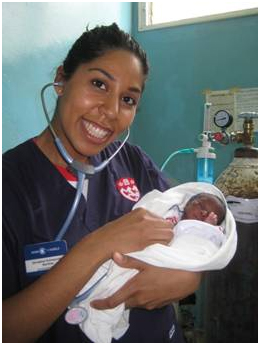 In parts of West African rural Ghana, there is no electricity and the nearest water pump is a three-kilometre hike. One or two cars are shared between an entire village and people walk for hours to get medical care.
In parts of West African rural Ghana, there is no electricity and the nearest water pump is a three-kilometre hike. One or two cars are shared between an entire village and people walk for hours to get medical care.
This is where one day last spring, recent McGill nursing student Christine Echegaray-Benites set out for a shift as a clinical intern. Armed with only a bag of basic medical supplies and her wits, she climbed onto a motorcycle behind her companions – a local nurse with her baby strapped to her back – and they drove forty-five minutes to the village.
“Then we were really in a different side of Ghana,” Echegaray-Benites says of the contrast between their destination and the more urban surroundings of the Effia Nkwanta Regional Hospital, where she spent most of her internship.
In the village, she delivered malaria medications, along with polio and Hepatitis B vaccines. She cleaned and bandaged farmers’ wounds, and taught health promotion and family planning.
“They had so much knowledge even though they had so little,” recalls Echegaray-Benites. “Here we’re used to technology and tests, and there, it was about going back to basics.”
The return to basics was one of Echegaray-Benites’ goals while setting up her internship through the McGill School of Nursing’s Ambassador Program and the international organization Work the World. The 23-year-old of Peruvian descent knew the experience would sharpen her critical thinking and further her love of medicine. The opportunity to work in a country plagued by higher mortality rates and chronic shortages of medical practitioners was a natural choice.
Echegaray-Benites remembers assisting doctors in delivering babies at the Effia Nkwantah Regional Hospital near the capital city of Accra. Before newborns were discharged, they would be taken in the arms of their mothers who, along with the nurses, would start praying and singing. “They said, ‘We’re thanking God that our babies are healthy, that we received good care here and that we’re going home.’ To be a part of that was really beautiful.”
During one of Echegaray-Benites’ shifts, a male prisoner needing fluid to be drained from his lungs arrived in the emergency room. “He was handcuffed to a bed in the farthest corner of the room. He was in terrible shape.” She requested that he be admitted immediately to the OR. “When I came back the next day, the man was still handcuffed to the bed and still hadn’t received any treatment.” She had to go directly to the surgeon who had not been informed of the inmate’s presence. “That was really the first time I put ethics training into practice.”
Graduate work and a return to Africa might be in Echegaray-Benites’ future, but today she is working in the ICU at the Royal Victoria Hospital, while preparing for her licensing exam.
“I think the internship was really a memorable experience,” she says. “It was life-enriching to be able to see the world through a different lens. Here you’re in the city, you know all the people, you know all the hospitals, and you know how it works. But going outside your comfort zone… to learn and collaborate with them. I think that was a privilege.”
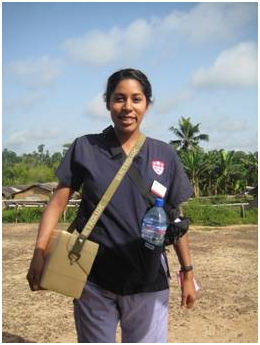
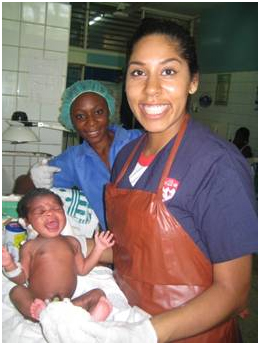
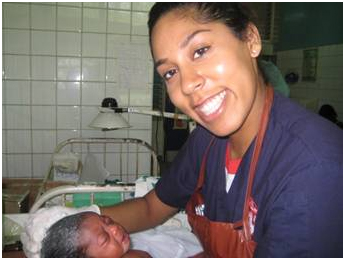
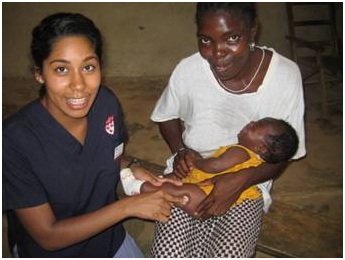
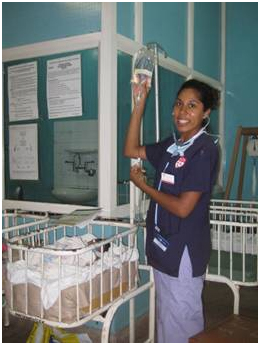
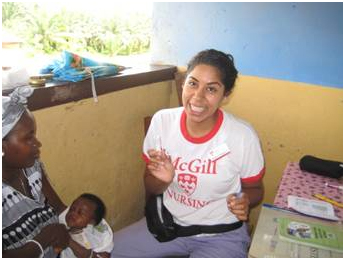
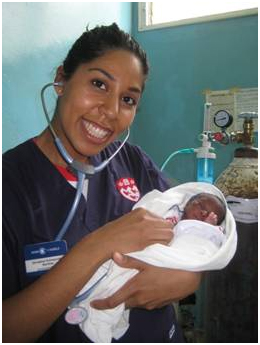 Dans certaines parties rurales du Ghana, en Afrique occidentale, il n’y a pas d’électricité et la pompe à eau la plus proche se trouve à une distance de trois kilomètres. Un village au complet se partage une ou deux voitures et les gens marchent pendant des heures pour obtenir des soins médicaux.
Dans certaines parties rurales du Ghana, en Afrique occidentale, il n’y a pas d’électricité et la pompe à eau la plus proche se trouve à une distance de trois kilomètres. Un village au complet se partage une ou deux voitures et les gens marchent pendant des heures pour obtenir des soins médicaux.C’est là que, par une journée du printemps dernier, une nouvelle étudiante en sciences infirmières de l’Université McGill, Christine Echegaray-Benites, a entrepris un quart de travail comme interne clinique. Armée uniquement d’un sac de fournitures médicales de base et de sa sagesse, elle est montée sur une motocyclette derrière ses compagnons, une infirmière de l’endroit et son bébé attaché dans son dos, pour effectuer avec eux un trajet de 45 minutes jusqu’au village.
« Nous étions alors vraiment dans un coin différent du Ghana », a déclaré Christine pour décrire le contraste entre leur destination et les environs plus urbains de l’Hôpital régional Effia Nkwanta, où elle avait effectué la majorité de son internat.
Au village, elle a administré des médicaments contre le paludisme, ainsi que des vaccins contre la polio et l’hépatite B. Elle a nettoyé et bandé les blessures de fermiers, et a enseigné la promotion de la santé et la planification des naissances.
« Ils possédaient beaucoup de connaissance même s’ils étaient pauvres », se rappelle Christine Echegaray-Benites. « Ici, nous sommes habitués à la technologie et aux tests, mais là-bas, il fallait retourner aux soins de base. »
Ce retour aux sources était l’un des objectifs de Christine lorsqu’elle a préparé son internat par l’entremise du Programme des ambassadeurs de l’École des sciences infirmières de l’Université McGill et de l’organisation internationale Work the World. La jeune femme de 23 ans de descendance péruvienne savait que l’expérience aiguiserait son sens critique et approfondirait son amour pour la médecine. L’occasion de travailler dans un pays aux prises avec des taux de mortalité plus élevés et des pénuries chroniques de praticiens médicaux fut un choix naturel.
Christine Echegaray-Benites se rappelle avoir assisté des accoucheurs à l’Hôpital régional Effia Nkwanta, près de la capitale Accra. Avant qu’un nouveau-né ne quitte l’hôpital, sa mère le prenait dans ses bras et, avec les infirmières, commençait à prier et à chanter. « Elles disaient : ‘Nous remercions Dieu d’avoir mis au monde des bébés en santé, d’avoir reçu de bons soins, ici, et de retourner à la maison.’ C’était vraiment beau de faire partie de cela. »
Pendant un des quarts de travail de Christine, un prisonnier nécessitant une ponction pulmonaire est arrivé dans la salle d’urgence. « Il était attaché à un lit avec des menottes, dans le coin le plus éloigné de la pièce. Il était dans un état pitoyable. » Elle a demandé qu’il soit admis immédiatement dans la salle d’opération. « Quand je suis revenue, le lendemain, l’homme était encore menotté au lit et n’avait encore reçu aucun traitement. » Elle a dû s’adresser directement au chirurgien qui n’avait pas été informé de la présence du prisonnier. « Ce fut vraiment la première fois que j’ai dû mettre en pratique ma formation en éthique. »
Pour Christine Echegaray-Benites, l’avenir pourrait se traduire par un travail à l’université et un retour en Afrique. Mais en ce moment, elle travaille à l’unité des soins intensifs de l’Hôpital Royal Victoria tout en préparant son examen d’aptitude.
« Je pense que l’internat a véritablement été une expérience mémorable », a-t-elle déclaré. « C’était enrichissant du point de vue humain de voir le monde sous un angle différent. Ici, nous sommes en milieu urbain, nous connaissons tous les gens, tous les hôpitaux et comment ça fonctionne. Mais sortir de sa zone de confort, apprendre et collaborer avec d’autres…Je pense que c’était un privilège. »






